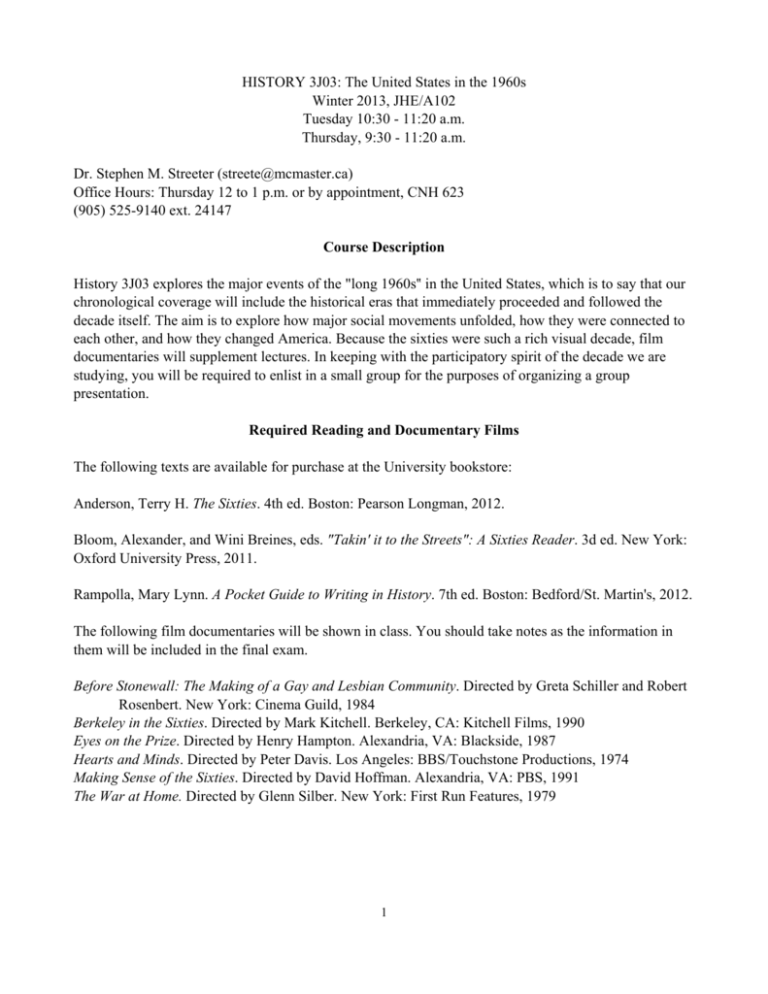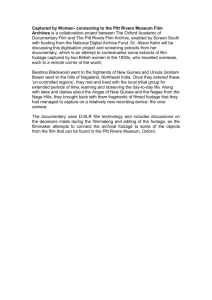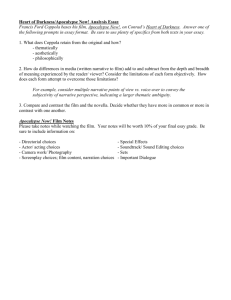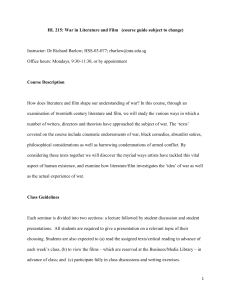
HISTORY 3J03: The United States in the 1960s
Winter 2013, JHE/A102
Tuesday 10:30 - 11:20 a.m.
Thursday, 9:30 - 11:20 a.m.
Dr. Stephen M. Streeter (streete@mcmaster.ca)
Office Hours: Thursday 12 to 1 p.m. or by appointment, CNH 623
(905) 525-9140 ext. 24147
Course Description
History 3J03 explores the major events of the "long 1960s? in the United States, which is to say that our
chronological coverage will include the historical eras that immediately proceeded and followed the
decade itself. The aim is to explore how major social movements unfolded, how they were connected to
each other, and how they changed America. Because the sixties were such a rich visual decade, film
documentaries will supplement lectures. In keeping with the participatory spirit of the decade we are
studying, you will be required to enlist in a small group for the purposes of organizing a group
presentation.
Required Reading and Documentary Films
The following texts are available for purchase at the University bookstore:
Anderson, Terry H. The Sixties. 4th ed. Boston: Pearson Longman, 2012.
Bloom, Alexander, and Wini Breines, eds. "Takin' it to the Streets": A Sixties Reader. 3d ed. New York:
Oxford University Press, 2011.
Rampolla, Mary Lynn. A Pocket Guide to Writing in History. 7th ed. Boston: Bedford/St. Martin's, 2012.
The following film documentaries will be shown in class. You should take notes as the information in
them will be included in the final exam.
Before Stonewall: The Making of a Gay and Lesbian Community. Directed by Greta Schiller and Robert
Rosenbert. New York: Cinema Guild, 1984
Berkeley in the Sixties. Directed by Mark Kitchell. Berkeley, CA: Kitchell Films, 1990
Eyes on the Prize. Directed by Henry Hampton. Alexandria, VA: Blackside, 1987
Hearts and Minds. Directed by Peter Davis. Los Angeles: BBS/Touchstone Productions, 1974
Making Sense of the Sixties. Directed by David Hoffman. Alexandria, VA: PBS, 1991
The War at Home. Directed by Glenn Silber. New York: First Run Features, 1979
1
Rules and Regulations
Academic Integrity Language:
You are expected to exhibit honesty and use ethical behaviour in all aspects of the learning process.
Academic credentials you earn are rooted in principles of honesty and academic integrity.
Academic dishonesty is to knowingly act or fail to act in a way that results or could result in unearned
academic credit or advantage. This behaviour can result in serious consequences, e.g. the grade of zero
on an assignment, loss of credit with a notation on the transcript (notation reads: “Grade of F assigned
for academic dishonesty”), and/or suspension or expulsion from the university.
It is your responsibility to understand what constitutes academic dishonesty. For information on the
various types of academic dishonesty please refer to the Academic Integrity Policy, located at
http://www.mcmaster.ca/academicintegrity
The following illustrates only three forms of academic dishonesty:
1. Plagiarism, e.g. the submission of work that is not one’s own or for which other credit has been
obtained.
2. Improper collaboration in group work.
3. Copying or using unauthorized aids in tests and examinations.
Email Communication
It is the policy of the Faculty of Humanities that all email communication sent from students to
instructors (including TAs), and from students to staff, must originate from the student's own McMaster
University email account. This policy protects confidentiality and confirms the identity of the student.
Instructors will delete emails that do not originate from a McMaster email account.
Avenue to Learn
In this course we will be using Avenue to Learn. Students should be aware that, when they access the
electronic components of this course, private information such as first and last names, user names for the
McMaster e-mail accounts, and program affiliation may become apparent to all other students in the
same course. The available information is dependent on the technology used. Continuation in this course
will be deemed consent to this disclosure. If you have any questions or concerns about such disclosure
please discuss this with the course instructor.
Modifications to Course Outline
The instructor and university reserve the right to modify elements of the course during the term. The
university may change the dates and deadlines for any or all courses in extreme circumstances. If either
type of modification becomes necessary, reasonable notice and communication with the students will be
given with explanation and the opportunity to comment on changes. It is the responsibility of the student
to check their McMaster email and course websites weekly during the term and to note any changes.
Extensions or Accommodations
Extensions or other accommodations will be determined by the instructor and will only be considered if
supported by appropriate documentation. Absences of less than 5 days may be reported using the
McMaster Student Absence Form (MSAF) at www.mcmaster.ca/msaf/. The MSAF form must submitted
on or just before the day of the absence. If you are unable to use the MSAF, you should document the
absence with your faculty office. In all cases, it is YOUR responsibility to follow up with the instructor
immediately to see if an extension or other accommodation will be granted, and what form it will take.
There are NO automatic extensions or accommodations.
2
Support Services
The University provides a variety of support services to help students manage their many demands.
Reference librarians can provide invaluable research assistance. The Student Accessibility Services
Centre (SAS) provides assistance with personal as well as academic matters. MUSC B107 and
http://sas.mcmaster.ca/
Classroom Etiquette:
Please arrive at class on time. Frequent arrivals and departures can be disruptive, especially during the
viewing of documentary films. Please do not bring food into the classroom, make or receive phone
calls, or play electronic games while the class is in session.
Grading
film review (750 words minimum)
group presentation (12 minutes)
essay (2500 words minimum)
final exam (essay and multiple choice)
10%
30%
30%
30%
Each component of your final grade will be graded numerically and posted on Avenue using the 100
point grading scheme described in the undergraduate course calendar. It is your responsibility to keep
backup copies of all written work that you do for this course. Computer malfunctions will not be
accepted as valid excuses for late assignments. All legitimate excuses (illness and extreme family
emergencies) for late assignments must be addressed in writing to the instructor with the appropriate
documentation. That you have a heavy course load this term, have decided to leave early for vacation,
or have scheduled work or artistic performances that conflict with this class DO NOT constitute
acceptable excuses.
Film Review:
Each student must write a short film review analyzing the film documentary Eyes on the Prize. Use
the same specifications that are required for the research essay (see below) except that the length
should be at least 750 words. Document your essay with footnotes, but no bibliography is necessary.
Don't try to imitate professional film critics, but rather analyze the film as a historical document. You
must include in your analysis of the film a discussion of the same events in the relevant sections of the
Bloom and Anderson texts. For example, how does the account of the lunch counter sit-ins that
appears in episode 3 of Eyes on the Prize compare with Anne Moody's account in "Takin' it to the
Streets" and Anderson's description in The Sixties? In short, how does documentary film enrich or
shape an interpretation of an historical event constructed from primary and secondary textual sources?
This assignment is due in class on February 5. Late papers should be turned into the history
department "dropbox? on the sixth floor of Chester New Hall and will be penalized 10 points per day
(weekends count as one day).
Group Presentation:
Beginning on January 16 at 8 am, you will be able to enroll in a presentation topic using Avenue’s
group function. No more than 5 students can sign up for any given topic. These slots will be filled on a
first come first served basis. Do not jump the gun. Students who try to enroll in advance will be
3
forcibly moved to another group of the instructor's choosing.
1.
2.
3.
4.
5.
6.
7.
8.
9.
10.
11.
12.
civil rights
black liberation
race riots
new left
Berkeley free speech movement
Great Society
antiwar movement
counterculture
conservative backlash
American Indian Movement or Chicano Rebellion
women’s liberation movement
lesbian and gay liberation movement
The form and the focus of the presentation is left up to your group's imagination. Role plays or skits
can be highly entertaining, but remember that your primary goal is to educate yourselves as well as the
class. Do not try to provide a textbook summary of the topic. The presentation must make a historical
point and be based on the relevant documents in "Takin' it to the Streets" and sources from the group
members' research essays. Presentations should last 12 minutes and involve all group members.
Groups that exceed 12 minutes will be cut off. Your peers will evaluate each group presentation using
the PRESENTATION EVALUATION FORM (on Avenue). Any group member who fails to turn in
the evaluation form or fails to show up for the presentation will receive a grade of 0 for the group
presentation grade. Students with valid excuses for missing the group presentations must contact the
instructor with the appropriate documentation.
Tips on how to organize a successful group presentation:
1. In devising a presentation be both innovative and practical. Look at the evaluation forms on
carefully to see how you will be judged by your peers.
2. Rehearse your presentation several times. Stay within the 12 minute time limit.
3. Introduce yourself and your topic and make sure that every group member participates actively in
the presentation.
4. Speak loudly so everyone can hear, and don't rush. Maintain eye contact with the audience.
5. Make sure you have all the necessary equipment and are ready to go on time. Remember there
will be only a few minutes for transitions between groups.
6. Prepare for the possibility that one or more group members might drop out or not show up on the
day of the presentation. What will be your back up plan?
4
Essay:
This assignment offers you an opportunity to make use of the research that you conducted for your
group presentation. For example, if your group is doing a presentation on black liberation, you might
decide to investigate the following question: "To what degree was the federal government's secret
operation (COINTELPRO) responsible for the failures of the Black Panthers?? Research for this paper
could then be utilized in a group presentation assessing the effectiveness of the Panthers as a black
liberation organization.
The McMaster American History Website is a good place to begin your research. There you will find
advice about finding books, journal articles, Internet sources and more. Also useful is the "Additional
Reading" section in the back of your textbook. Finally, check Avenue for sources that the instructor
will place on "virtual reserve.?
To receive a passing grade you must cite a minimum of 3 secondary and 3 primary sources and the
essay must be a minimum of 2500 words in length. Do not cite textbooks, encyclopedias, or
dictionaries. You may cite documents from Bloom, "Takin' it to the Streets," but this source will not
be counted toward the minimum. The research essay is due in class on the day that your group
presents to the class. Late papers will be penalized 10 points per day.
Use the following checklist to make sure your essay meets all of the necessary requirements. Various
point deductions will be made for failure to follow these directions.
1. Document the essay with endnotes in accordance with the style format described in the Pocket
Guide. Textbooks and class lectures are NOT appropriate sources for this assignment. Internet sources
must be documented and must not constitute the majority of sources used.
2. The essay must be typed with a normal size font (i.e. 12 characters per inch), and be a minimum of
4,000 words in length. Use one-inch margins (sides, top and bottom) and double space the text. Leave
the right margin ragged (i.e. do not make the text flush with the right margin like a newspaper would).
3. Number the pages and staple them together in the upper left-hand corner. Please: no papers bound
together with paper clips or report covers.
4. On the cover page state the topic in question format, your name, the instructor's name, course
number, word count, and date.
5. Use third person and don't be pedantic. Apply the well known writing formula: "show, don't tell."
6. State your thesis early in the paper, typically after the topic has been introduced and the
historiography has been reviewed.
7. Begin paragraphs with topical sentences. Indent each paragraph but do not put an extra line space
between them. Keep the opening paragraph to a reasonable length (i.e. 2/3 of a page).
8. Keep quotations to a minimum. Learn to paraphrase. When you do quote, indicate in the main text
who is speaking and document the quotation in an endnote. Do NOT use the author-date system. Note
5
numbers should be placed at the end of the sentence.
9. Proofread your essay carefully for grammatical errors. Sloppy work will be penalized.
10. Provide two bibliographical lists: one for all the primary sources and one for all the secondary
sources that appear in the notes. Use the bibliographical format described in the Chicago Manual of
Style.
Final Exam:
The final exam will be 3 hours in length and will include essay and multiple choice questions based on
all the material covered in the lectures, films, readings, and presentations.
Class Schedule
Date
Classroom Activity
Reading Assignment
Anderson
Bloom
Jan 8
Introduction
Jan 10
film documentary: Making Sense of the Sixties, pts 1 and 2
1-16
Jan 15
lecture: Civil Rights Movement
17-35
ch.1
Jan 17
film documentary: Eyes on the Prize, pts. 3 and 4
Jan 22
lecture: The New Left
36-39, 54
ch. 2
Jan 24
lecture: Great Society
film documentary: Eyes on the Prize, pt. 5
40-65
Jan 29
film documentary: Eyes on the Prize, pt. 6
Jan 31
film documentary: Berkeley in the Sixties
74-75
Feb 5
lecture: Black Panthers, Black Power, and Cointelpro
FILM REVIEW DUE
67-79
Feb 7
lecture: The Vietnam War: An Overview
first meeting of groups
6
ch. 3
Feb 12
groups meet individually to work on presentations
Feb 14
film documentary: Hearts and Minds
WINTER RECESS
Feb 26
lecture: Antiwar Movement
79-83, 15360
ch. 4
Feb 28
film documentary: The War At Home
Mar 5
groups meet individually to work on presentations
Mar 7
film documentary: Making Sense of the Sixties, pt. 3
104-107,
116-35
chs. 5 and 6
Mar 12
lecture: American Indian Movement and Chicano Rebellion
144-48,
180-81
Mar 14
film documentary: Making Sense of the Sixties, pts. 4 and 5
83-104,
107-15
ch. 7
Mar 19
presentations #1-3
Mar 21
lecture: Women’s Liberation Movement
161-63,
172-74
ch. 8
Mar 26
presentations #4-6
Mar 28
film documentary: Before Stonewall
152-53
Apr 2
presentations #7-9
Apr 4
film documentary: Making Sense of the Sixties, pt. 6
Apr 9
presentations #10-12
7
183-93
ch. 9








